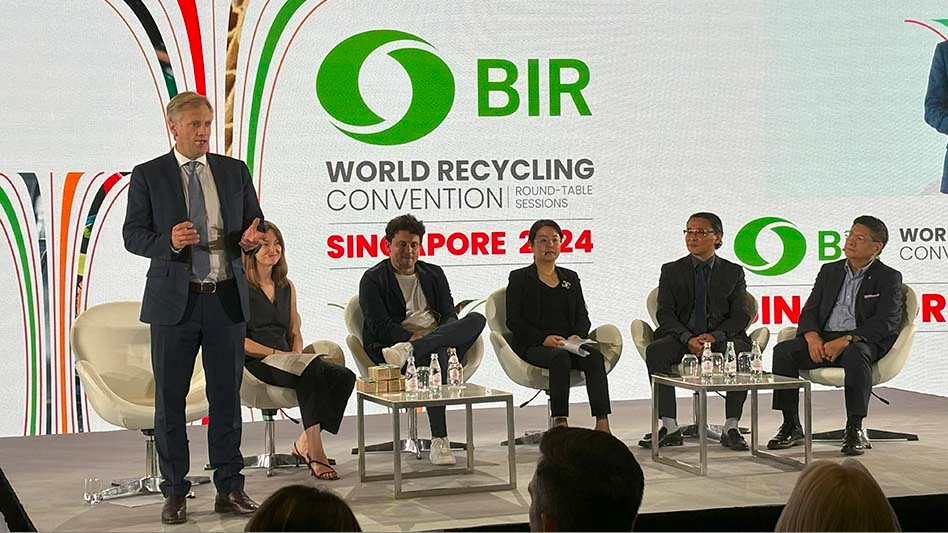
Recycling Today archives
Investments in recycled-content aluminum, copper and copper alloy production around the world have some concerned that cross-border trade in nonferrous scrap could be facing a difficult future.
The autumn 2024 Non-Ferrous Division meeting of the Brussels-based Bureau of International Recycling (BIR) included two presenters talking about new melt shop capacity they are installing followed by a panel discussion where the future of global scrap supplies was a leading topic.
At the meeting, held in Singapore in late October, Vivian Jiang of China-based Ningbo Jintian Copper described how her company is investing in its home country and in Thailand to make recycled-content copper products.
Ningbo Jintian made 1.9 million metric tons of copper and brass last year and garnered revenue of $20 billion in 2023. While already sizable, the company is building added capacity in Thailand, Jiang said.
Anthony Wong of aluminum producer Delta Metal, which has an office in Hong Kong and four scrap processing and secondary ingot plants in South China, said his company is adding to its 450,000 tons per year output by building a plant in Thailand.
Wong’s message to delegates investing in and conducting business in the Association of Southeast Asian Nations (ASEAN) countries—which includes Thailand and its neighbor Malaysia—was to be mindful of cultural norms and regulatory rules.
Potential problems could result from not understanding cultural differences, bypassing or ignoring regulations and policies and being caught off guard by currency fluctuations.
“You walk in like an idiot, you get killed,” Wong said of the risks in investing overseas. “No shortcuts; don’t be a [cost-cutting] hero—it will come back to haunt you.”
Sean Davidson of global metals information and pricing service Davis Index identified the issue of future scrap availability and made it a focus of his comments at the meeting.
In addition to the ASEAN expansions portrayed by other panelists, Davidson referred to investments in recycled-content aluminum and copper in the United States.
“It’s coming,” he said of tighter scrap supplies, citing No. 1 and No. 2 copper grades as two that will be “extremely difficult” for overseas buyers to obtain by the end of this decade.
Davidson said there is some "excellent innovation" that is coming in technology to turn aluminum scrap into new low-carbon footprint metal, adding that billions of dollars are being invested in scrap surplus regions such as North America and Europe that could keep such scrap within those regions.
The three presenters were joined in the panel discussion by trader Dong Shen of U.S. scrap processor OmniSource Corp., plus BIR Non-Ferrous Division officers Paul Coyte of F. Hayes & Co., New Zealand, and Natallia Zholud of TRM Group, Poland.
Dong acknowledged the new capacity but did not foresee a complete disappearance of cross-border trade. He and Jiang referred to scrap generation as rising and poised to grow more in China and the ASEAN region.
Not commented on was how much of the new capacity being installed will truly be additional capacity and how much may wind up being replacement capacity for older facilities that will be uncompetitive and shut down.
The panelists also referred to a recent Chinese government announcement that hinted at loosening restrictions on imported scrap materials. Wong said the policy aim could be to “relax the rule a little bit” but advised caution.
Jiang indicated some categories of “acceptable” scrap imports are being unified and potentially expanded to include some alloys that currently are not covered by any category or code in place.
The 2024 BIR World Recycling Convention Round-Table Sessions was held at the Raffles City Convention Center/Fairmont Hotel in Singapore on Oct. 27-29.
Latest from Recycling Today
- Aqua Metals secures $1.5M loan, reports operational strides
- AF&PA urges veto of NY bill
- Aluminum Association includes recycling among 2025 policy priorities
- AISI applauds waterways spending bill
- Lux Research questions hydrogen’s transportation role
- Sonoco selling thermoformed, flexible packaging business to Toppan for $1.8B
- ReMA offers Superfund informational reports
- Hyster-Yale commits to US production





